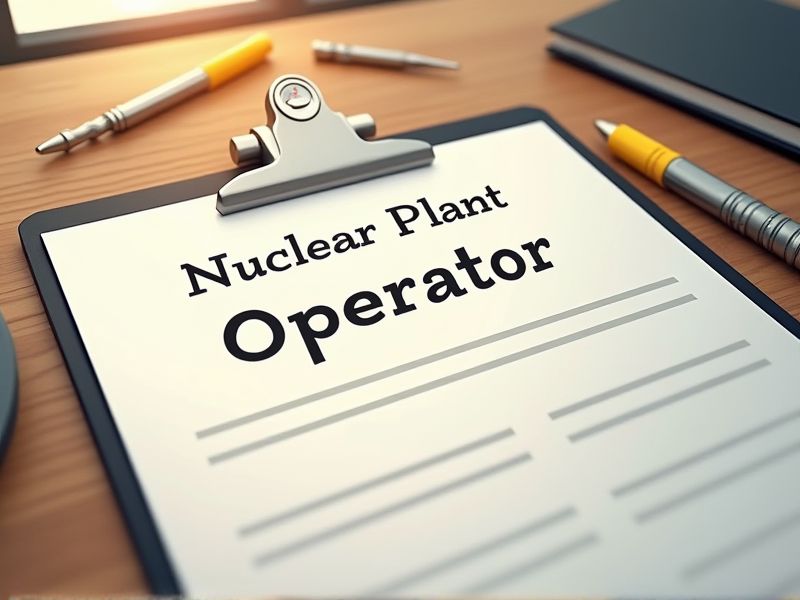
Nuclear power plant operators are responsible for overseeing the safe and efficient operation of nuclear reactors, necessitating specialized knowledge and skills. Critical certifications ensure operators possess the technical acumen and safety protocols essential for minimizing risks associated with nuclear energy. Regulatory bodies mandate these certifications to uphold the highest safety and operational standards in such sensitive environments. Consider these crucial certifications you might require as a Nuclear Power Plant Operator.
NRC Reactor Operator License
The NRC Reactor Operator License ensures operators have the necessary expertise to manage nuclear reactors safely, reducing the risk of accidents. Nuclear power plants handle radioactive materials, requiring certified personnel to adhere strictly to safety protocols and regulatory standards. Licensed operators are trained to respond effectively to emergencies, minimizing potential harm to the environment and public health. The licensing process involves rigorous testing, which assures that operators possess competent decision-making skills under pressure.
NRC Senior Reactor Operator License
The NRC Senior Reactor Operator License ensures operators have the knowledge and skills to safely manage nuclear reactor operations. Without this license, operators may lack the necessary expertise to respond effectively to potential incidents, increasing safety risks. Licensing involves rigorous training and examination, which promotes high standards of operational competence. This credential also aligns with regulatory requirements to ensure consistent safety practices across nuclear facilities.
NRC Shift Supervisor License
The NRC Shift Supervisor License ensures that a nuclear power plant operator possesses the necessary expertise to manage plant operations safely and efficiently. This licensing promotes regulatory compliance and helps in preventing accidents that could otherwise risk public safety. It validates the operator's capability to make critical decisions under pressure, ensuring plant stability. The license also reflects a high level of training and knowledge, which is essential for maintaining operational integrity.
Radiation Protection Technician Certification
Radiation protection technician certification ensures operators understand the principles of radiation safety, minimizing the risk of exposure to harmful levels. The certification provides operators with knowledge on monitoring and assessing radiation, crucial for maintaining safe working conditions. Regularly updated training and evaluations support compliance with industry regulations and standards, enhancing overall operational safety. Certification also boosts operator credibility and trust, potentially improving safety records and reducing liability.
HAZWOPER Certification
HAZWOPER Certification is needed for Nuclear Power Plant Operators to ensure they are trained to handle hazardous materials safely, adhering to regulatory requirements. In nuclear facilities, operators may encounter dangerous substances, and proper certification reduces potential health risks. With this training, operators are equipped to implement appropriate emergency response protocols during incidents involving hazardous waste. Certification also supports compliance with Occupational Safety and Health Administration (OSHA) standards, essential for maintaining safe operational environments in nuclear power plants.
OSHA 30-Hour General Industry Certification
The OSHA 30-Hour General Industry Certification enhances a nuclear power plant operator's ability to identify and mitigate workplace hazards, ensuring safer operations. By understanding regulatory compliance and safety protocols, operators can reduce the risk of accidents and costly shutdowns. A certified operator is better equipped to foster a safety-first culture, improving overall plant efficiency and morale. This certification aligns with industry standards, supporting operators' professional development and credibility in the sector.
Emergency Management Institute (EMI) Certification
Obtaining Emergency Management Institute (EMI) Certification ensures that nuclear power plant operators are equipped with essential knowledge to handle crises effectively. This certification trains operators in emergency response protocols crucial for minimizing risk during nuclear incidents. With EMI certification, operators gain expertise in coordinating with local and federal emergency management agencies, thereby improving response efficiency. Certification also reinforces a culture of safety within nuclear facilities, aligning operator skills with national standards for emergency preparedness.
Industrial Safety and Risk Management Certification
Industrial Safety and Risk Management Certification equips nuclear power plant operators with essential skills to identify and mitigate potential hazards, ensuring a safer working environment. Training in safety standards reduces the likelihood of accidents and operational failures, which can have catastrophic consequences. Certification fosters a culture of compliance and awareness, aligning with regulatory requirements and promoting public trust. Enhanced risk management capabilities contribute to continuous operational efficiency and emergency preparedness.
Basic Life Support (BLS) Certification
Nuclear power plant operators work in a high-risk environment where the potential for medical emergencies is significant, necessitating Basic Life Support (BLS) certification. This certification equips operators with the skills to perform CPR and other critical life-saving techniques, which is vital in maintaining the safety of personnel on-site. The presence of hazardous materials and complex machinery increases the likelihood of accidents, reinforcing the need for immediate medical intervention capabilities. Employers often require BLS certification as part of compliance with safety regulations and industry standards to ensure a prepared and resilient workforce.
Nuclear Quality Assurance Certification
Nuclear Quality Assurance Certification ensures strict adherence to safety protocols, reducing the risk of accidents. A certified operator is more likely to competently identify and mitigate potential failures. Regulatory compliance is mandated for operational approval and avoids legal repercussions. Consistent quality assurance fosters public confidence in nuclear energy as a safe alternative power source.
Summary
With certification, readers can anticipate an increase in the operator's credibility and trust. This usually leads to enhanced operational safety and efficiency in the nuclear power plant. Certification often results in better compliance with regulatory standards, minimizing the likelihood of incidents. Public perception and confidence in the plant's operations tend to improve due to the certified operator's proven expertise.
